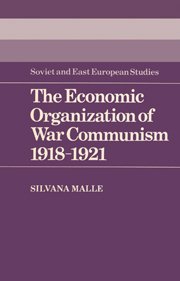Book contents
Summary
THE LITERATURE ON WAR COMMUNISM
A large number of scholars have been concerned with the history of war communism in the Soviet Union. Broadly, two interpretations have emerged. The first, which originated in the twenties, when the political implications of the revolution were still being worked out, tends to focus on the ideological origins of the new system. The second, which is the result of a cooler perspective on past events, tends to emphasize the emergency character of the economic measures adopted in connection with the civil war and relegates the ideological aspect to ex post facto rationalizations.
A characteristic of the first kind of interpretation is the lack or scattered nature of evidence to prove the point of ideological bias or inspiration of the economic policy adopted in the early years of the revolution. There is no systematic scrutiny of the Marxist literature produced before and after the revolution, and whenever any attempt in this direction is made, the reader is confronted with limited excerpts and with a literal interpretation of the content, deprived of historical perspective. Economic policy is often confused with declaration of principles. Vice versa, excessive focus on emergency as the immediate cause of all measures in the economic field tends to a neglect of the impact of the ideological framework which conditioned the number of possible choices and produced a bias in the evaluation of effective choices.
These remarks apply to the Western as well as to the Soviet literature.
- Type
- Chapter
- Information
- The Economic Organization of War Communism 1918–1921 , pp. 1 - 28Publisher: Cambridge University PressPrint publication year: 1985

